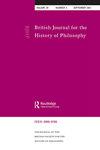《亚里士多德论性别差异:形而上学、生物学、政治》,玛格丽特·德斯劳里耶著,纽约,牛津大学出版社,2022年,第16页+ 354页,110美元(hb), ISBN: 978-0-19-760618-6
IF 0.7
2区 哲学
0 PHILOSOPHY
British Journal for the History of Philosophy
Pub Date : 2023-09-28
DOI:10.1080/09608788.2023.2259432
引用次数: 0
摘要
点击放大图片尺寸点击缩小图片尺寸感谢Sukaina Hirji阅读本文草稿。注1也见Nielsen,“动物的私处”(378),developing Witt,“形式、规范性和性别”我同意盖尔伯的观点,我们需要区分“在制造能力方面有缺陷”和“在生殖过程中有缺陷”(《亚里士多德胚胎学中的女性》,175页);我的问题(首先)是关于后者的正如查尔斯(“亚里士多德论代理”,第24页)所指出的;参见查尔斯,亚里士多德的《行为哲学》(24n14):“它所拥有的其他条件能力,例如,如果部分受阻,将在不同的情况下实现相同的能力”)和克雷斯,“亚里士多德论自发发生”(185-6)。另见Makin,亚里士多德:形而上学书θ,关于“将能力的内容与其承载者在理想环境下的行为相一致”的观点(105;3 .见122关于De Caelo)因此,有人可能会反驳说,充分炮制就是达到了一个“门槛”——但如果它不是来自能力,而是过程的标准,而不是结果的标准,那么我们需要进一步说明(进一步)完美的相关标准(见n. 2) 5Hirj:“制鞋的艺术,在它的内部,有某种规范的标准:它的最充分的表达不只是在生产鞋子,而是在生产[原文如此]优秀的鞋子”(“外部商品”,47)。当一个鞋匠“生产出一只平庸的鞋子,即使这是她在有限的材料条件下所能生产的最好的鞋子”,她就“不够好”(47)。本文章由计算机程序翻译,如有差异,请以英文原文为准。
Aristotle on sexual difference: metaphysics, biology, politics Aristotle on sexual difference: metaphysics, biology, politics , by Marguerite Deslauriers, New York, Oxford University Press, 2022, pp. xvi + 354, $110.00 (hb), ISBN: 978-0-19-760618-6
Click to increase image sizeClick to decrease image size AcknowledgementsThanks to Sukaina Hirji for reading a draft of this review.Notes1 See also Nielsen, “Private Parts of Animals” (378), developing Witt, “Form, Normativity, and Gender”.2 I agree with Gelber that we need a distinction between being “defective with respect to the ability to concoct” and “being defective results of the generative process” (“Females in Aristotle’s Embryology”, 175); my question is (in the first instance) about the latter.3 As Charles (“Aristotle on Agency”, n. 24) notes; see Charles, Aristotle’s Philosophy of Action (24n14: “[t]he other conditional capacities it possesses, e.g. to ψ if partially impeded, will be realisations of the same capacity under differing circumstances”) and Kress, “Aristotle on Spontaneous Generation” (185–6). See also Makin, Aristotle: Metaphysics Book θ, on views that “identif[y] the content of a capacity with what its bearer does under ideal circumstances” (105; see 122 on De Caelo).4 One thus might resist by arguing that to fully concoct is to hit a ‘threshold’ – but then we need a further account of the relevant standard for (further) perfection, if it does not come from the capacity and is yet a standard for the process and not its result (see n. 2).5 Hirj: “the art of shoemaking has, internal to it, a certain kind of normative standard: its fullest expression is not just in producing shoes, but in produing [sic] excellent shoes” (“External Goods”, 47). When a shoemaker “produces a mediocre shoe, even if it is the best shoe she could produce given the limited materials available”, she “falls short” (47).
求助全文
通过发布文献求助,成功后即可免费获取论文全文。
去求助
来源期刊

British Journal for the History of Philosophy
PHILOSOPHY-
CiteScore
1.10
自引率
16.70%
发文量
78
期刊介绍:
BJHP publishes articles and reviews on the history of philosophy and related intellectual history from the ancient world to the end of the 20th Century. The journal is designed to foster understanding of the history of philosophy through studying the texts of past philosophers in the context - intellectual, political and social - in which the text was created. Although focusing on the recognized classics, a feature of the journal is to give attention to less major figures and to disciplines other than philosophy which impinge on the history of philosophy including political theory, religion and the natural sciences in so far as they illuminate the history of philosophy.
 求助内容:
求助内容: 应助结果提醒方式:
应助结果提醒方式:


